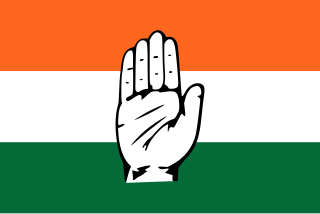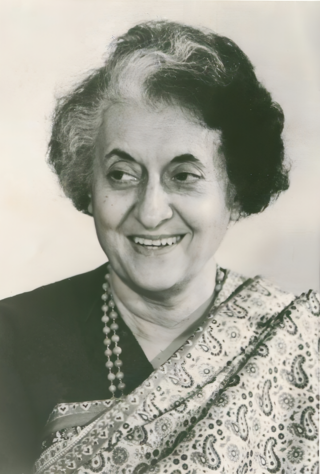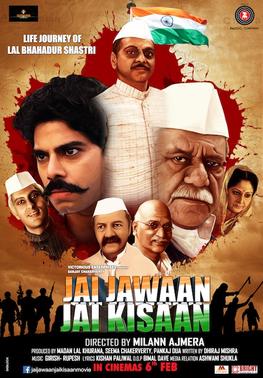Smiling Buddha was the code name of India's first successful nuclear weapon test on 18 May 1974. The nuclear fission type bomb was detonated in the Pokhran Test Range of the Indian Army in Rajasthan. As per the United States military intelligence, the operation was named as Happy Krishna.

Lal Bahadur Shastri was an Indian politician and statesman who served as the second prime minister of India from 1964 to 1966. He previously served as the sixth home minister of India from 1961 to 1963.

The Indian National Congress (INC), colloquially the Congress Party or simply the Congress, is a political party in India with deep roots in most regions of India. Founded on 28 December 1885, it was the first modern nationalist movement to emerge in the British Empire in Asia and Africa. From the late 19th century, and especially after 1920, under the leadership of Mahatma Gandhi, the Congress became the principal leader of the Indian independence movement. The Congress led India to independence from the United Kingdom, and significantly influenced other anti-colonial nationalist movements in the British Empire.

Morarji Ranchhodji Desai was an Indian independence activist and politician who served as the 4th Prime Minister of India between 1977 and 1979 leading the government formed by the Janata Party. During his long career in politics, he held many important posts in government such as Chief Minister of Bombay State, Home Minister, Finance Minister and 2nd Deputy Prime Minister of India.

The Tashkent Declaration was signed between India and Pakistan on 10 January 1966 to resolve the Indo-Pakistani War of 1965. Peace was achieved on 23 September through interventions by the Soviet Union and the United States, both of which pushed the two warring countries towards a ceasefire in an attempt to avoid any escalation that could draw in other powers.

Gulzarilal Nanda was an Indian politician and economist who specialised in labour issues. He was the Interim Prime Minister of India for two 13-day tenures following the deaths of Jawaharlal Nehru in 1964 and Lal Bahadur Shastri in 1966 respectively. Both his terms ended after the ruling Indian National Congress's parliamentary party elected a new prime minister. He was awarded the Bharat Ratna, India's highest civilian award, in 1997.
Events in the year 1964 in the Republic of India.
Events in the year 1971 in the Republic of India.
Events in the year 1972 in the Republic of India.

Homi Jehangir Bhabha, FNI, FASc, FRS(30 October 1909 to 24 January 1966) was an Indian nuclear physicist who is widely credited as the "father of the Indian nuclear programme". He was the founding director and professor of physics at the Tata Institute of Fundamental Research (TIFR), as well as the founding director of the Atomic Energy Establishment, Trombay (AEET) which was renamed the Bhabha Atomic Research Centre in his honour. TIFR and AEET served as the cornerstone to the Indian nuclear energy and weapons programme. He was the first chairman of the Indian Atomic Energy Commission and secretary of the Department of Atomic Energy. By supporting space science projects which initially derived their funding from the AEC, he played an important role in the birth of the Indian space programme.

The Indian National Congress was established when 72 representatives from all over the country met at Bombay in 1885. Prominent delegates included Dadabhai Naoroji, Surendranath Banerjee, Badruddin Tyabji, Pherozeshah Mehta, W. C. Banerjee, S. Ramaswami Mudaliar, S. Subramania Iyer, and Romesh Chunder Dutt. The Englishman Allan Octavian Hume, a former British civil servant, was one of the founding members of the Indian National Congress.

10, Janpath is a public-owned house on Janpath. At the time of Rajiv Gandhi's assassination in 1991, while he was campaigning for a second term as Prime Minister of India, 10, Janpath was his official residence, although he lived at 7, Lok Kalyan Marg while he was prime minister. 10, Janpath remains the residence of his widow Sonia Gandhi, who is a former President of Indian National Congress party. The national headquarters of Indian National Congress (INC) is right behind it on 24, Akbar Road. It was the residence of India's second prime minister, Lal Bahadur Shastri (1964–1966) and where his body lay in state on 11 January 1966. Today his biographical museum, Lal Bhadur Shastri Memorial is situated at 1, Motilal Nehru Place, adjacent to the complex.

The 3rd Lok Sabha, was elected in February–March 1962. The Lok Sabha is the lower house in the Parliament of India. The election was held for 494 seats out of which Indian national congress won 361 seats. 14 sitting members from Rajya Sabha were elected to 3rd Lok Sabha after the 1962 Indian general election.

General elections were held in India between 17 and 21 February 1967 to elect 520 of the 523 members of the fourth Lok Sabha, an increase of 15 from the previous session of Lok Sabha. Elections to State Assemblies were also held simultaneously, the last general election to do so.

The premiership of Lal Bahadur Shastri extended from 9 June 1964 to 11 January 1966. Formerly the Minister of External Affairs, Shastri became the Indian Prime Minister after the death of Jawaharlal Nehru, India's first Prime Minister, on 27 May 1964. Shastri's tenure as Prime Minister lasted only nineteen months due to his sudden death in Tashkent.

Sachindra Chaudhuri was an Indian lawyer and politician who was Minister of Finance of the Government of India from 1965 to 13 March 1967, under Lal Bahadur Shastri and Indira Gandhi. He also was Director of several companies, member of Central Board of State Bank of India, member of Law Commission and member of Indian delegation to General Assembly of the United Nations.

The First Indira Gandhi ministry was formed on 24 January 1966 under the premiership of Indira Gandhi who was elected as the Prime Minister of India by the Congress Parliamentary Party to succeed Gulzarilal Nanda who was serving as the acting prime minister since 11 January 1966 following the untimely demise of Lal Bahadur Shastri. The cabinet remained in office until the 1967 general election in which Indira Gandhi was re-elected to office.

Jai Jawaan Jai Kisaan is a 2015 Indian Hindi-language biographical drama film directed by Milan Ajmera. It is based on the life of former Indian Prime Minister Lal Bahadur Shastri and is titled after his popular slogan of the same name.

The Leader of the House in Lok Sabha is the parliamentary chairperson of the party that holds a majority in the Lok Sabha and is responsible for government business in the house. The office holder is usually the prime minister if they are a member of the house. If the prime minister is not a member of the Lok Sabha, usually the senior-most minister in the union cabinet serves as the leader of the house.

















